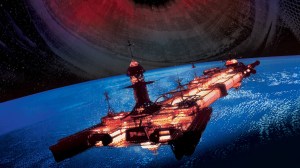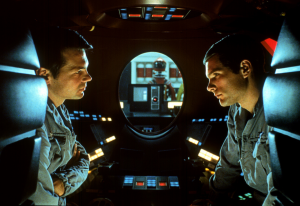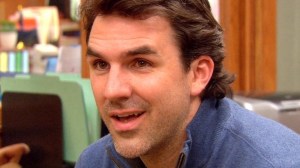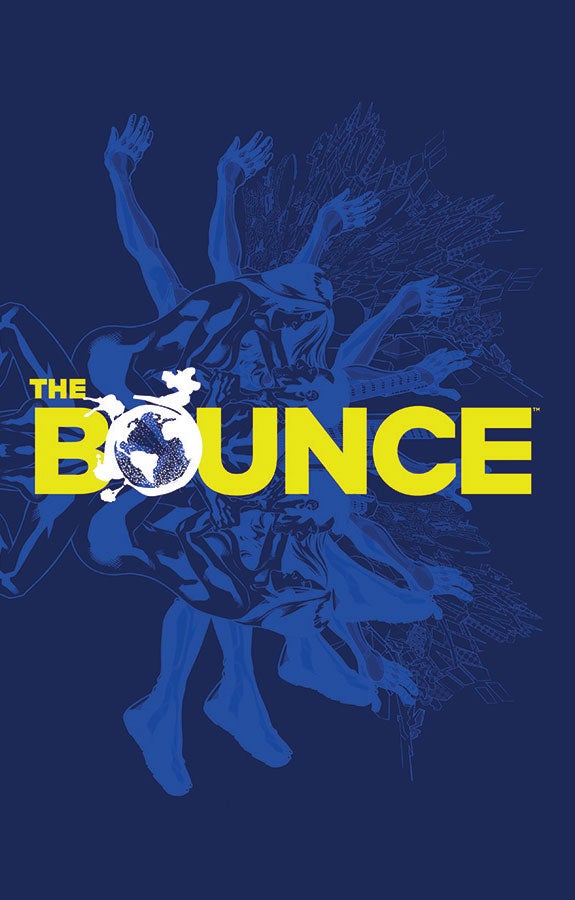
The collection of Joe Casey’s psychedelic neo-superhero romp, THE BOUNCE, was released in trade paperback this week. With Sonia Harris, David Messina, Gaetono Carlucci, Claudia Scarletgothica, and Rus Wooten on board, the book is a vibrant example of how, when used by the right minds, superheroes are one of the greatest fictional tools for dealing with serious, difficult issues like personal transcendance, human connection, and the deep-rooted reciprocity between the personal and universal.
Videos by ComicBook.com
Casey and Co.’s THE BOUNCE is a heady, complex brew of vibrant superhero psychedelia, to be sure, so I sat down with the man himself to find out just what ingredients were used to cook up such a potent dose:
SEVERE SPOILERS AHEAD
Let’s start off with The Bounce himself, Jasper. I read in interviews with you elsewhere that this is character is what you saw as “cracking the code” of Spider-Man’s long-lasting cultural impact. The Bounce seems like you trying to capture some of that mojo into a new, thoroughly millennial character, so could you talk about him and what you see as his cultural relevance.
JC: I suppose I should come clean on the whole “Spider-Man code” thing. One a very pragmatic level, I had a series debuting and I was doing my due diligence promoting it. I figured that the character — in its original inception — bore some resemblance to the type of character Spider-Man was. Young, wisecracking, enthusiastic, etc. It wasn’t too much of a stretch to make the comparison. But the whole “code” thing was me doing a bit of hyperbolic two-stepping. So sue me. The fact is, there is no secret code to Spider-Man. The things that make that character great — what make him work — are right there on the surface. Everyone knows them. I wanted to tap into those same kinds of things for the Bounce, but updated slightly to put it more in the here and now. To be honest, the basic idea that I didn’t really feel like telling anybody when I was promoting the book was, “What if you took a Spider-Man-style character and placed him in the middle of a story with ambitions of Watchmen-style complexity?” That was the real mojo I was trying to capture in this book.
In terms of the Bounce’s relevance, my hope was that if a Twentysomething reader were to pick up the book, they just might recognize a little of themselves in Jasper Jenkins and his friends… that this was a character who, on some level, spoke to that specific, somewhat aimless period in a person’s life. We all seem to go through it. Post-schooling, pre-career… that moment in time when you’re just kinda bumming around with your friends, enjoying the general hang, indulging in a bit of fun, recognizing your own lack of responsibility and taking some advantage of that. And, obviously, we take Jasper on a particular journey… one that can maybe serve as some sort of metaphor for that moment — which we all eventually face — where we have to grow up a little, where we take on our own adulthood as a conscious choice, where we accept — or, in some cases, confront — the fact that we’re part of a larger world.
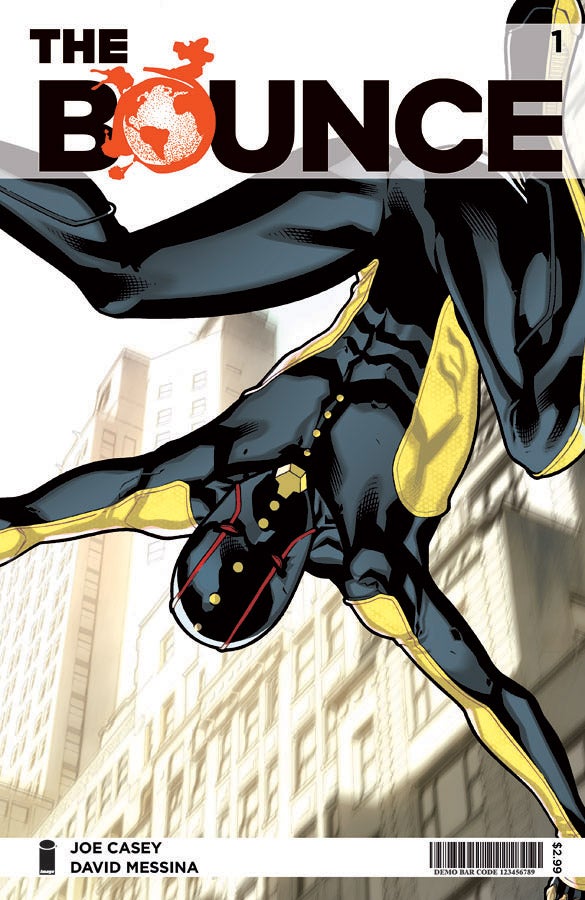
Tell us about the world in The Bounce. Obviously it’s a pretty direct reflection of our own modern western world as it is today, but I’m interested to hear about how you see Jasper and his relationship to that world at the beginning/middle of the story (we’ll get to the end later).
JC: At first, Jasper is your typical superhero. He’s basically playing the game as most superheroes would: he’s got a secret identity, he’s insinuating himself into situations where he thinks he’s needed, etc. All the tropes are there. But he’s basically projecting a version of himself and not concerning himself so much with the world around him, aside from how he can affect things (through superheroic crimefighting, in this particular case) and how well he can protect himself (through his secret identity). It’s like starting from square one with the character, indulging in the more familiar aspects of the costumed superhero concept. A lot of it is a pose, meant to compensate for whatever insecurities that gaining superpowers don’t ever get rid of. And, of course, being so young, Jasper is all about himself. Sure, he’s “doing good”, but you can bet it’s not for completely altruistic reasons. As with a lot of things you do at that age, he’s not quite sure why he’s doing it.
On a separate note, I’d like to talk to you about Jasper’s roommate, Terry. I thought your portrayal of cross dressing was tasteful, and the conversation between Terry and Jasper in issue #3 brought up some funny and truthful parallels between the two. I’d like to hear a little more about your take on that parallel, and why you wanted to hit that beat in a story like The Bounce.
JC: The thing about Terry… I wanted to present an alternative situation where someone is hiding a dual identity. Obviously, there’s a parallel. But there’s something deeper at work, too. It’s a basic theme of the series: if you deny your authentic self — who and what you truly are — then you’re not living life to the fullest. You’re always going to be selling yourself short. Jasper and Terry are roommates and friends, so the fact that either one felt they needed to keep that level of a secret from the other is very emotionally telling. Their friendship takes a huge turn when they accidentally “out” each other and end up having a real conversation about it. It’s a moment of real connection between two people. Again, another theme of the overall story at work.
So would you say that Jasper is acting the way he is -smoking a lot of pot and being of a general drop-out frame of mind- because he’s hiding from himself and from others because of the general state of the world he’s living in? One that is full of overwhelming conflict, despair, and impending collapse? Is that typical superhero trope of going out and fighting local crime his way of 1) making himself feel important and/or powerful in the face of personal and global despair?
JC: Yeah, that’s definitely an element of it, that whole idea of a world that’s somehow broken on some sort of fundamental level, a world that needs to be “healed” in some way. When the story begins, all that is a pretty subtle undercurrent to the narrative. And that was on purpose. I didn’t want to completely put Jasper’s — and everyone else’s, for that matter — feelings of displacement on the sci fi plot conceit that makes itself known as the story goes deeper. Some of it had to do with him, on a personal level. But I also like the idea of a young guy doing something that extreme, not because he’s has some higher calling, but because it’s something to do. There’s an aimless quality to it that I relate to from when I was in my early 20’s. He’s a slacker that’s just now taking a very unconventional step toward actually contributing to society in some way. In his own way, he’s already asking questions at the beginning of the story… it’s just that he’s not asking the right questions yet.
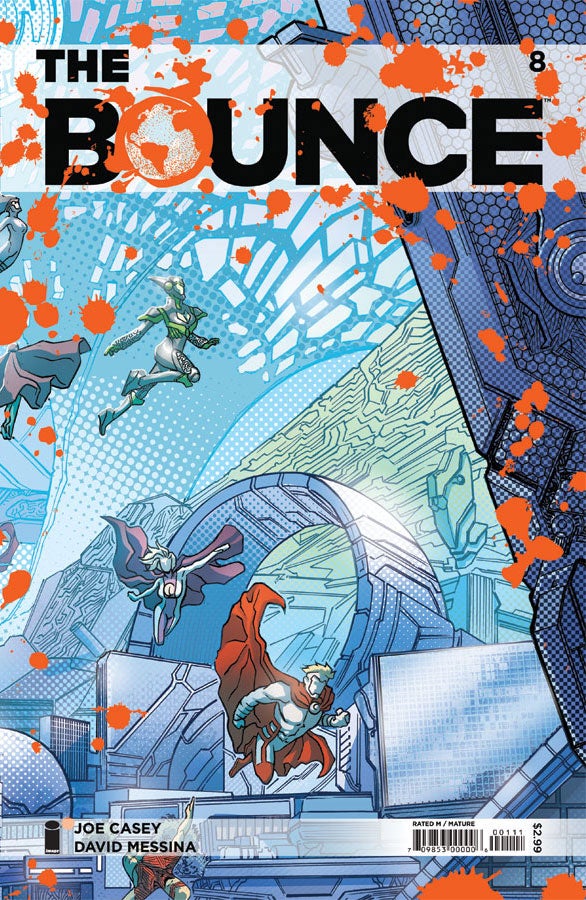
The other personal line for Jasper connects to his older brother, obviously, who as an assistant D.A., is also fighting crime in his own way, which seems to inform Jasper’s decision to use his newfound superpowers to “do good.” There are a lot of interesting juxtapositions and parallels between the two brothers, including their drug use, and opposite sides of the legal line.
JC: Well, a lot of that was intentionally built into the relationship. Again, it’s leaning into those superhero tropes that, at the beginning, I wanted to present in a very familiar way to readers who are well-versed in this type of material. He’s secretly a vigilante hero, his older brother’s the assistant D.A. who’s out to get all the costumed nuts running around the city. Their parents are dead. As brothers, they don’t get along. It’s a relationship of a type we’ve seen countless times before, but in the case of this story, it’s a jumping off point for both of them. I shaded it a little bit, with Jasper being a more recreational drug user and Jeremiah being secretly addicted to pills. Not to mention, Jeremiah is willing to bend the law a little bit to keep Jasper out of serious trouble. And yet he’s incredibly hard line about rounding up “the freaks” (of which Jasper is one of them). All those things put together end up painting a fairly complex picture. Their family and their relationship is just as “broken” as the world is.
So you said that real connections between people is an ongoing theme in the book, and I’d like to bring that out a bit more. In the story it seems that it’s those character moments between people, the connections, that bring about a kind of clarity and positive change in the story, to differing degrees. But that seems a bit reductionist, so I’d like to hear a little bit more about that theme from your perspective.
JC: It’s one of the areas where the story gets very personal for me. I do believe that it’s authentic human intimacy that ultimately fulfills us, that carries us through our lives. It’s where you can find the greatest meaning. Not to get too New Age-y about it, but it took a long time for me to come to that conclusion in my own life. I went through a lot of my own shit to get there. And, look, I’m still on that journey to finding my authentic self and living that way, 100%. But I’m a lot closer than I was, say, six or seven years ago. And part of getting there has a lot to do with being honest with yourself, learning who you are and coming to terms with that, whatever it may be. Now, obviously, we’re telling a story here, so a lot of that stuff is interlaced in the plot and the metaphors we’re working with. And, y’know, I don’t even know if I’d say it was particularly “reductionist”, either. Those moments may seem small — especially in a story like this, where things get so big and so apocalyptic — but, for me, they’re huge. They’re the reason for telling the story at all.
I’m curious about the use of drugs in The Bounce. Drugs have been a bit of a recurring theme in some of your work. In The Bounce, there is an interesting diversification of uses and perspectives on drugs, especially between the two brothers. The notion of using drugs as a means to escape from the world (Jasper) versus trying to deal with it (his brother). Then there is The Darling, who has his own concoction of strange lizards and an ayahuasca derivative to hone his mind to function in a higher perspective. There’s also The Fog, whose vaporous powers function like a drug, and then there is the Sex Magic, which, though isn’t a drug, functions similarly in the sense of shifting perception…
JC: You kinda touched on them all there, actually. The idea of a substance — one that exists outside of yourself — that can alter your life or your perceptions in some way (either positive or negative, but significant either way) is an idea I’ve explored in other work, but here I did make it a little more central to the narrative. It certainly illuminates the differences in Jasper and Jeremiah in particular in what I hope, for the reader, is very immediate. Obviously, all that stuff falls away eventually and you’re left facing yourself in a very naked way. The right drugs may feel good for awhile or take you someplace really interesting, but eventually you have to honestly confront yourself and examine exactly what you are. You have to see yourself clearly. Now, there’s no real “message” there aside from what I feel is a basic human truth… which is, at the end of the day, the place you really want to get to is that authentic version of yourself.
I’m curious about The Darling. In a certain sense, The Bounce is very much a story about him in as much as it is about Jasper. It ultimately seems, at the end of the story, that The Darling was the triumphant protagonist, in a certain sense, with the battle and victory ultimately being his. Throughout the story he is really the only one who not only understands what’s going on, but is actually the architect of change in the story. Further, it’s interesting, and maybe this is just me reading into it, but it seems like you intentionally presented him as a “bad guy” initially, a standing that slowly changes as the story progresses…
JC: Purely on the writing side of things, I liked the idea that one character’s life serves as the backstory for the entire plot. The Darling’s past could’ve been its own book. He certainly goes through enough shit to constitute it. In fact, I had all that backstory with Vainglorious Vox and the time traveling adventures within his younger body literally years before the story of the Bounce finally coalesced. Obviously, it’s also a situation where this kind of storytelling, more of a novel than a never-ending narrative (which is what most superhero comicbooks are), I have a chance to play against the readers’ expectations. So, in this case, presenting a character and allowing the reader to be lulled into some false sense of security — thinking they know who the big bad guy is — only to peel more layers of the onion as the story unfolds and finally reveal that the character you thought was the villain is actually aiming to be the savior of all existence. In that way, in real contrast to most of the other characters, he’s a new brand of superhero. Sure, he’s got a funky name but he doesn’t wear spandex. Sure, he’s got abilities beyond the norm, but he applies them as a scientist might, not as a dyed-in-the-wool superhero would. And, ultimately, his presence and his function in the story is what, for me, takes this book to some new place. At least, as far as my body of work (such as it is) is concerned.
Then let’s juxtapose The Darling with Jasper. Jasper is essentially powerless in the story. He doesn’t know what’s going on, doesn’t know how to fix anything, and at the end he ultimately plays no role other than bait in that final confrontation with Golg%chk. There was a line that really stood out to me during the big showdown when Jasper cries to The Darling ” Lemme help you… lemme play my part…” Throughout the book there are lots of hints at Jasper being “the real deal” superhero, as opposed to his other rogues gallery characters, but that’s never really explained… What is it that really makes Jasper special when he was ultimately powerless to save the day?
JC: Well, there’s the most obvious thing that separates him from the others… when he found himself with these extraordinary abilities, he was the only one who even thought to become a superhero. That, in itself, is significant. Realistically, the other characters reacted as I think most people would, if they gained superpowers of some kind… they would exploit their newfound gifts to serve only themselves. They’d feed their own greed. So, as ham-fisted as it might come across, at least Jasper was trying to be somewhat altruistic. And Jasper was never meant to “save the day” as a normal superhero would. He’s just a player in the bigger drama. He really was just looking for the place where he fit in.
What is the significance of Sauterne, and Japser’s relationship to it? Is that name a reference to something? All I could find on a cursory google search had to do with wine…
JC: There is an added significance to the name, but it’s kinda personal and I’d like it to remain that way. But Jasper’s relationship to it is a core issue of the book… it represents a place where one can experience an idealized version of the self, a place where one’s potential to finally be self-actualized is finally fulfilled. A place where all the bullshit is filtered out, where everything is right out in the open (where, one would argue, it belongs). Of course, this isn’t an across-the-board paradise. Zander, for instance, has incredible difficulty there because he’s just a normal guy trapped there. The other significance of the Sauterne, I think, is obvious… it’s the piece of reality that we’re missing. The sense of wonder and imagination that fuels us. The aspirational part of our psyches. In our book, Jasper’s “reality” is slowly dying from a distinct lack of what the Sauterne contains. This is what the Darling is trying to fix… he’s the only one who knows the bigger picture, who sees the schism for what it is. And Jasper is a physical embodiment of that schism. He’s got a foot planted in both realities. And his journey in the book is all about finding his place, his authentic self. As it turns out, that coincides with — and directly correlates to — what the Darling is trying to do.

Let’s talk about the big baddie here. Golg%chk. It seems like it’s a kind of Lovecraftian embodiment of the darkness implicit in our world and lives. It’s an interesting notion that it was what “infected” our world from the beginning of time, that the pervasive sense of something wrong/missing/bad in our lives isn’t actually supposed to be there; that it’s alien to the original design. It’s also interesting that Golg%chk is attracted to superheroes, which is how The Darling lures it into our world, and then again even more interesting that Golg%chk’s ultimate downfall was brought about not by a superhero, but by a human using superheroes to confront evil…
JC: Well, in actuality, Golg%chk is an X factor in the grand scheme of things. It’s like a moth attracted to flame. Or, to be more specific, to life. To the divine spark, so to speak. If you look at the Darling’s backstory, it’s all kinda there. Golg%chk is not the thing that has infected our reality… that was already there. It’s been there from the beginning of history. The Darling’s discovery of this creature-thing is what sets him on the ultimate path to “curing” our ailing dimension.
And, like I said before, I guess I feel like the Darling is a superhero all his own. He’s a 21st Century superhero, where the Bounce — the character — is all about indulging and exploring all the tropes of a more standardized, 20th Century superhero. With the Darling, I took a lot of those tropes and tweaked them a bit, to see if a new kind of archetype would emerge and stand on its own two feet. And as the story evolves, I think we move past the idea of the superhero completely. Or, at least, into a new iteration of the superhero… the complete, fully-authentic human being. The Darling’s choice in the story is whether or not to sacrifice himself for that evolutionary process to fully occur.
Finally, looking back on The Bounce, now that all is said and done, how do you feel? I know it’s been a while since you finished the story at this point. Now that you’ve had time to reflect, what are your thoughts and feelings on The Bounce?
JC: I think everyone did great work on this thing… from Messina to Sonia Harris to Giovanna Niro (and the other colorists that pitched in) to Gaetano Carlucci and Rus Wooton, I feel like everyone gave 100% to making this thing happen. So when we all see the finished, collected edition… it feels like a real accomplishment. There’s a sense of completeness to it that I hope I can really appreciate. And knowing that this story — this unique comicbook experience — is out there in its final format does provide a weird satisfaction. Maybe I still don’t have the right amount of distance to have the proper perspective, but that’ll come in time, too. You live with these things as you’re making them, you inhabit them in every conceivable way. But when it’s done, it’s done. And I’m happy to be able to release it out into the wild, once and for all. On to the next thing!





